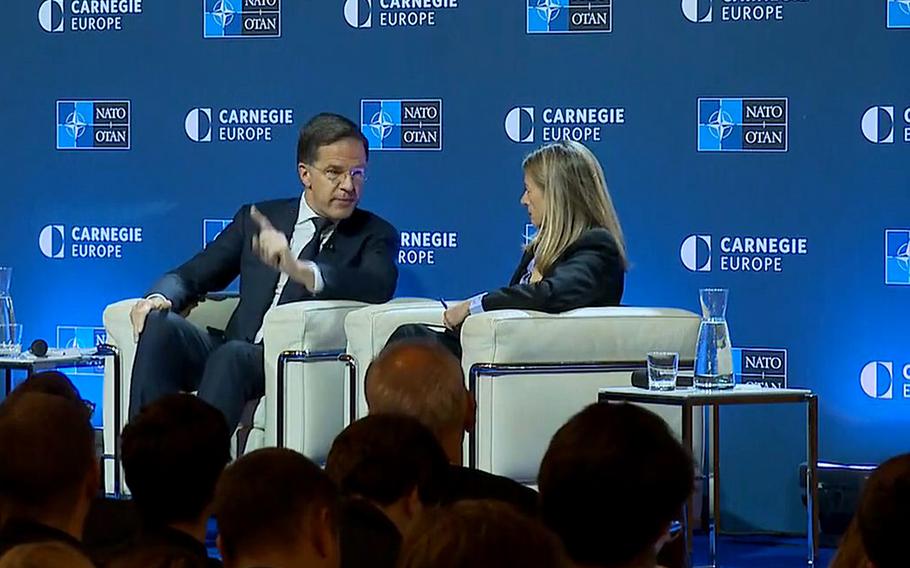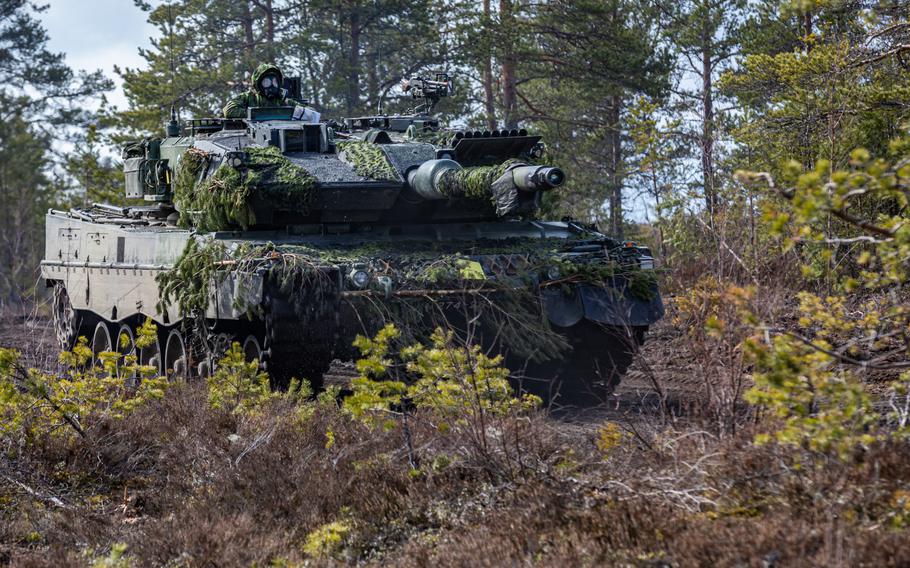
NATO Secretary-General Mark Rutte speaks with Rosa Balfour, director of the Carnegie Europe think tank, in Brussels on Dec. 12, 2024. In a speech beforehand, Rutte urged Europeans and Canadians to start calling on their governments to raise defense spending. (NATO)
The top official in the U.S.-led NATO alliance issued a direct appeal Thursday to residents of countries in the bloc, asking them to demand big increases in defense spending in the face of Russia’s aggression.
Secretary-General Mark Rutte’s comments amount to the most forceful and direct call from a NATO leader in years to ramp up spending on the military. They come as allies prepare for U.S. President-elect Donald Trump’s return to the White House.
Trump has blasted NATO repeatedly over the years for falling short on defense spending and has made increased expenditures the focal point of his approach to the bloc.
“Citizens living in NATO countries, especially in Europe and Canada, it’s you I’m talking to. It’s your support I need,” Rutte said, adding that the security situation is “undoubtedly the worst” in his lifetime.
While war with Russia is not imminent, the Kremlin’s military buildup and transition to a wartime economy have Russia outpacing allies in Europe and putting NATO at risk, Rutte added.
“Danger is moving towards us at full speed,” he said in his speech in Brussels. “We must not look the other way. We must face it.”
Allies need to get back to a Cold War mentality of spending more than 3% of gross domestic product on defense, he said. A level of 2% of GDP has been the alliance’s long-standing benchmark.
But many member states have regularly missed even the 2% threshold. In 2014, the number that hit the target was just three. Currently, about 20 of the bloc’s 32 members spend at least that much.

Finnish soldiers maneuver a German-made Leopard 2A6 tank during an exercise in Finland in 2023. NATO Secretary-General Mark Rutte said Dec. 12, 2024, that many of the alliance’s member countries must increase their defense spending. (John Schoebel/U.S. Army National Guard )
Sweden and Finland joined NATO in the wake of Russia’s full-scale invasion of Ukraine in February 2022. There have been more than 1 million casualties collectively in a war that is a day’s drive from alliance headquarters in Brussels, Rutte said.
“How many more wake-up calls do we need?” he said.
The public’s views on increasing defense spending vary across the alliance, with members closer to Russian territory the most bullish on ramping up.
Poland has said it will spend 5% of GDP on defense in the coming year. And the Baltic states also are top spenders per capita, along with the United States. But many western members of the alliance fall short, including Italy, Spain and Portugal.
Germany finally hit the 2% mark this year after a long history of paltry defense spending. It’s unclear whether Berlin is prepared to sustain that level or go higher. However, there are signs of domestic public support for pushing beyond the benchmark.
In November, a survey in Germany found that 65% of respondents support an expenditure of at least 3% of GDP on defense.
Meanwhile, Russia will spend about 8% of GDP on its military this year, enabling it to produce larger numbers of tanks, armored vehicles and ammunition.
“What Russia lacks in quality, it makes up for in quantity,” Rutte said. “With the help of China, Iran and North Korea, this all points in one clear direction: Russia is preparing for long-term confrontation with Ukraine and with us.”
While Europe’s defense industrial base has been hollowed out, Russian arms factories are churning out war equipment around the clock, he said.
Rutte urged allies in Europe to press banks and pension funds to invest in defense industries, something they don’t do now.
“It is simply unacceptable that they refuse (to do so),” he said. “Defense is not in the same category as illicit drugs and pornography. Investing in defense is an investment in our security.”